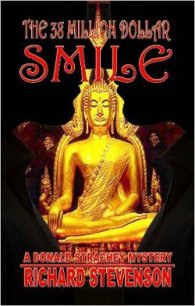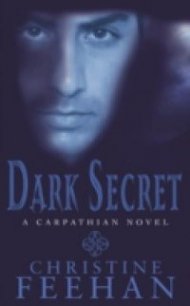Congo - Crichton Michael (читать книги полностью без сокращений бесплатно TXT) 📗
“I’ll be damned,” Elliot said. They picked their way through this field of paddles, and entered the building they came to call “the temple.”
It consisted of a single large square room. The ceiling had been broken in several places, and hazy shafts of sunlight filtered down. Directly ahead, they saw an enormous mound of vines perhaps ten feet high, a pyramid of vegetation. Then they recognized it was a statue.
Elliot climbed up on the statue and began stripping away the clinging foliage. It was hard work; the creepers had dug tenaciously into the stone. He glanced back at Munro. “Better?”
“Come and look,” Munro said, with an odd expression on his face.
Elliot climbed down, stepped back to look. Although the statue was pitted and discolored, he could clearly see an enormous standing gorilla, the face fierce, the arms stretched wide. In each hand, the gorilla held stone paddles like cymbals, ready to swing them together.
“My God,” Peter Elliot said.
“Gorilla,” Munro said with satisfaction.
Ross said, “It’s all clear now. These people worshiped gorillas. It was their religion.”
“But why would Amy say they weren’t gorillas?”
“Ask her,” Munro said, glancing at his watch. “I have to get us ready for tonight.”
3. Attack
THEY DUG A MOAT OUTSIDE THE PERIMETER FENCE with collapsible metalloid shovels. The work continued long after sundown; they were obliged to turn on the red night lights while they filled the moat with water diverted from the nearby stream. Ross considered the moat a trivial obstacle- it was only a few inches deep and a foot wide. A man could step easily across it. In reply, Munro stood outside the moat and said, “Amy, come here, I’ll tickle you.”
With a delighted grunt, Amy came bounding toward him, but stopped abruptly on the other side of the water. “Come on, I’ll tickle you,” Munro said again, holding out his arms. “Come on, girl.”
Still she would not cross. She signed irritably; Munro stepped over and lifted her across. “Gorillas hate water,” he told Ross. “I’ve seen them refuse to cross a stream smaller than this.” Amy was reaching up and scratching under his arms, then pointing to herself. The meaning was perfectly clear. “Women,” Munro sighed, and bent over and tickled her vigorously. Amy rolled on the ground, grunting and snuffling and smiling broadly. When he stopped, she lay expectantly on the ground, waiting for more.
“That’s all,” Munro said.
She signed to him.
“Sorry, I don’t understand. No,” he laughed, “signing slower doesn’t help.” And then he understood what she wanted, and he carried her back across the moat again, into the camp. She kissed him wetly on the cheek.
“Better watch your monkey,” Munro said to Elliot as he sat down to dinner. He continued in this light bantering fashion, aware of the need to loosen everybody up; they were all nervous, crouching around the fire. But when the dinner was finished, and Kahega was off setting out the ammunition and checking the guns, Munro took Elliot aside and said, “Chain her in your tent. If we start shooting tonight, I’d hate to have her running around in the dark. Some of the lads may not be too particular about telling one gorilla from another. Explain to her that it may get very noisy from the guns but she should not be frightened.”
“Is it going to get very noisy?” Elliot said.
“I imagine,” Munro said.
He took Amy into his tent and put on the sturdy chain leash she often wore in California. He tied one end to his cot, but it was a symbolic gesture; Amy could move it easily if she chose to. He made her promise to stay in the tent.
She promised. He stepped to the tent entrance, and she signed, Amy like Peter.
“Peter like Amy,” he said, smiling. “Everything’s going to be fine.”
He emerged into another world.
The red night lights had been doused, but in the flickering glow of the campfire he saw the goggle-eyed sentries in position around the compound. With the low throbbing pulse of the electrified fence, this sight created an unearthly atmosphere. Peter Elliot suddenly sensed the precariousness of their position-a handful of frightened people deep in the Congo rain forest, more than two hundred miles from the nearest human habitation.
Waiting.
He tripped over a black cable on the ground. Then he saw a network of cables, snaking over the compound, running to the guns of each sentry. He noticed then that the guns had an unfamiliar shape-they were somehow too slender, too insubstantial and that the black cables ran from the guns to squat, snub-nosed mechanisms mounted on short tripods at Intervals around the camp.
He saw Ross near the fire, setting up the tape recorder.
“What the hell is all this?” he whispered, pointing to the cables.
“That’s a LATRAP. For laser-tracking projectile,” she whispered. “The LATRAP system consists of multiple LGSDs attached to sequential RFSDs.”
She told him that the sentries held guns which were actually laser-guided sight devices, linked to rapid-firing sensor devices on tripods. “They lock onto the target,” she said, “and do the actual shooting once the target is identified. It’s a jungle warfare system. The RFSDs have maclan-baffle silencers so the enemy won’t know where the firing is coming from. Just make sure you don’t step in front of one, because they automatically lock onto body heat.”
Ross gave him the tape recorder, and went off to check the fuel cells powering the perimeter fence. Elliot glanced at the sentries in the outer darkness; Munro waved cheerfully to him. Elliot realized that the sentries with their grasshopper goggles and their acronymic weapons could see him far better than he could see them. They looked like beings from another universe, dropped into the timeless jungle.
Waiting.
The hours passed. The jungle perimeter was silent except for the murmur of water in the moat. Occasionally the porters called to one another softly, making some joke in Swahili; but they never smoked because of the heat-sensing machinery. Eleven o’clock passed, and then midnight, and then one o’clock.
He heard Amy snoring in his tent, her noisy rasping audible above the throb of the electrified fence. He glanced over at Ross sleeping on the ground, her finger on the switch for the night lights. He looked at his watch and yawned; nothing was going to happen tonight; Munro was wrong.
Then he heard the breathing sound.
The sentries heard it too, swinging their guns in the darkness. Elliot pointed the recorder microphone toward the sound but it was hard to determine its exact location. The wheezing sighs seemed to come from all parts of the jungle at once, drifting with the night fog, soft and pervasive.
He watched the needles wiggle on the recording gauges.
And then the needles bounced into the red, as Elliot heard a dull thud, and the gurgle of water. Everyone heard it; the sentries clicked off their safeties.
Elliot crept with his tape recorder toward the perimeter fence and looked out at the moat. Foliage moved beyond the fence. The sighing grew louder. He heard the gurgle of water and saw a dead tree trunk lying across the moat.
That was what the slapping sound had been: abridge being placed across the moat. In that instant Elliot realized they had vastly underestimated whatever they were up against. He signaled to Munro to come and look, but Munro was waving him away from the fence and pointing emphatically to the squat tripod on the ground near his feet. Before Elliot could move, the colobus monkeys began to shriek in the trees overhead-and the first of the gorillas silently charged.
He had a glimpse of an enormous animal, distinctly gray in color, racing up to him as he ducked down; a moment later, the gorillas hit the electrified fence with a shower of spitting sparks and the odor of burning flesh.


![[Magazine 1968-012] - The Million Monsters Affair - Davis Robert Hart (читать книги TXT) 📗](/uploads/posts/books/56864/56864.jpg)

